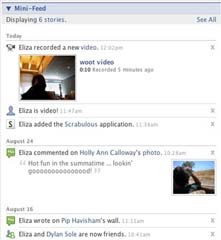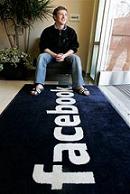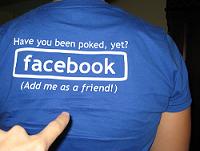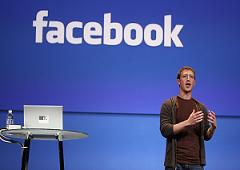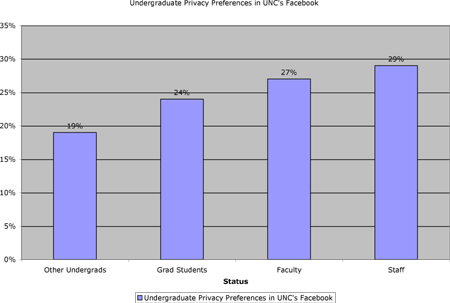Courses/Computer Science/CPSC 203/CPSC 203 Template/CPSC203 Template People/James King/Group 1
Contents
Introduction
Facebook is a social networking tool for interacting with friends and meeting new people. It is free and can be used by anyone with access to a computer. It allows users to easily create a personalized website with information about themselves from what their interests are, to what they did on the weekend. Through the networking portion of the website, people can find new friends and view the profiles of existing friends in several ways:
- Search friends of friends to find people in the same social group
- Search for people that have similar interests, hobbies etc.
- Search for people they know personally from the present or the past (i.e. old friends from school)
Because of its massive popularity and the ease with which information can be transferred from person to person, Facebook is also useful for businesses, clubs, and organizations to advertise their products and recruit new members. When a user joins an organization through Facebook, he can forward messages to people on his friend’s lists to encourage them to join. Also, when a user joins a group, Facebook posts an announcement on the websites of a random selection of that user’s friends. This allows more people to see that the organization exists and they may choose to join as well. This helps to further propagate the membership in the group. Many types of groups can benefit from this type of system including (but not exclusively):
- Clubs looking for membership
- Organizations looking to gain charitable donations
- Organizations with the aim of spreading awareness on a topic
- Musical groups looking to gain a fan base
- Business people tying to sell products or advertise their business
-Sandra
Overview of Facebook
Mini Feed and News Feed
The mini feed is a box on the user’s website that shows announcements of all the activity that has occurred on that persons account. This activity can include:
- Posting pictures or videos
- Writing on another users wall
- Information updates they have made to their profile
- Accumulation of new friends
- Changes in relationship status
The mini feed can be seen by anyone looking at that person’s profile. A similar feature called the news feed is displayed on each users account and is different for every user. This is because it randomly takes items from the mini feeds of that user’s friends and displays it on the users account. This gives the person an overview of their friend’s activities. If a person doesn’t want others to see something they have done, they can disable Facebook from displaying that activity in the mini feed and the news feed.
Information Box
The information box allows users to post information about themselves. This usually includes a short biography of their interests and hobbies, but it can also include personal facts such as their birthday, phone number and company information. It can be seen by anyone who can look at the user’s profile. However, users can restrict who sees their profile in many different ways. They can make it available for friends only, so the user must consent before a person can see their profile. They can also make people ‘restricted friends’, who can only see a small portion of the information displayed on the profile. This restriction of viewing can also be applied to the mini feed .
The Wall
The wall is a feature that allows people to receive messages from friends and to post messages on friend’s walls. If a user posts a message on a friend’s wall, it can potentially be seen by anyone if that friend has not put restrictions on who views their profile. Also, people that write on a user’s wall can potentially post inappropriate or personal information. That information would then be displayed on the users profile and also on the profiles of their friends via the news feed. Users can delete messages other people post on their walls, but by the time they read and delete the message it may be too late as it has often already been posted in various people’s news feeds.
-Sandra
Case Study
Facebook keens to be an environment for safe interaction among friends and the people around them. If you were to look at Facebook it has a safety page that states they are improving their tactics to situations all the times. It also states their improvements are things such as recognizing and removing inappropriate content including nudity and harassment; this is not necessarily taken into action unless the people doing the inappropriate content are “reported”. "Report" is a link on Facebook that you can click at any time when you feel as though someone is acting inappropriate. Also states in the safety page that Facebook is not applicable to people under the age of 13, I know for a fact this can be taken advantage of, my younger sister is just 13 and she has had face book for 2 years. You can lie about anything on face book, accessible to all.
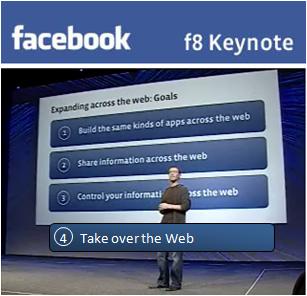 The statement of facebook taking over is an accurate display
The statement of facebook taking over is an accurate display
When individuals you are friends with tags you in a picture on face book, anyone you are friends with or the other persons friends can click on that picture and be on the persons full album plus their full webpage. If this happens, the individual’s personal life and information is no longer secured to the people of choice.
Universities and police authorities have access to your pages if they have a reason to believe you could be at fault for an incident. Meaning that if you have drinking pictures on face book, universities could place their own assumption on you that will decide your future.
Success of facebook
Facebook allows people to stay in contact with friends or family if they are far away in other countries, having the ability to not only talk to them as if on MSN but also see all their photos of adventures and good times. Also face book is at least giving you a chance to subject people who are harassing and being unreasonable.
Failures of facebook
Yes, they have recognized their flaws but it doesn’t seem that they are trying to fix the situations around peoples ability to go through pages, or anything else to make the sites more secure for everyone’s safety.
In the end we see that many people love facebook even with it's flaw, if security of personal information is an issue facebook may not be the social network to choose at this moment. In the future when the failures are fixed then absolutly, but for now we will stay side-ways.
History
Founded
Facebook was founded in 2004 by Mark Zuckerberg while attending Harvard University as a sophomore. He launched "The Facebook" originally located at thefacebook.com on February, with some financial help from Andrew McCollum and Eduardo Saverin. Within months, more than half of Harvard students have become registered users and then expanded to other colleges in the Ivy League.
Developing
In May 2004, he dropped out of Harvard and moved to Silicon Valley with McCollum and Dustin Moskovitz. In August 2005, “The Facebook” dropped the “The” and “Facebook.com” was registered for $200,000. In 2006, Facebook expanded once again. Now anyone with a valid email address could sign up and populate their profile with their stats- and signup they did.
In August 2006, Facebook introduced Facebook Notes, a blogging feature with tagging, embedded images, and other features, also allowing the importation of blogs from Xanga, LiveJournal, Blogger, and other blogging services. This newly added feature also included the common blog feature of allowing readers to comment on users’ entries.
Making Money
In May 2007, Facebook unveiled an initiative called “Facebook Platform”, inviting third-party software makers to create programs for the service and to make money on advertising alongside them. In August 2007 Facebook announced that it was looking to “translate its popularity into bigger profits” by offering advertisers direct access to their targeted demographic consumers.
-Zhibo Jin
Our Issue
Facebook has attracted the attention of millions of people around the world. With 100,000 new users signing up every day the Facebook community has become the largest and the most popular network in the world. However, this cyber community revolution has become such a hit that users neglect thinking about the consequences of revealing personal information such as date of birth, phone number and email – address. Allowing you to stay in touch with friends and meet new people, post photos and share fun little games and quizzes it gives an implication that your details are kept private and secure. However recent studies have found Identity theft to be a definite possibility and a growing threat to this community. At the corporate level, companies have blocked their employees from accessing facebook at work due in an attempt to minimize security risks to their company resulting from colleges giving away too much information on the site that could lead to Identity theft and targeted phishing attacks. While being the vehicle of the century for mass communication and networking it has also acquired the position of being the vehicle for spreading malicious content such as viruses etc.
- By Sanchita
Facebook Security
Something you would be faced with...
Postcard Spam
If a friend sends you a message or posts on your Wall with a link to a postcard for you to open, don't click on it. Chances are it's a virus that may cause your Facebook account to become compromised. If you do click on one of these links, run a virus scan and reset your Facebook password immediately.
Fake Emails
These emails include false notifications for friend requests and messages. They often link to phishing sites or include attachments with viruses. Never click on links in suspicious emails, and remember that real Facebook notifications don't include attachments.
False Chain Letter
Some users received a message claiming that Facebook is becoming overpopulated and suggesting that accounts will be deleted. This message is false and did not come from Facebook. It can be safely disregarded and deleted.
The Koobface Worm
The worm targets Facebook users, creates spam messages and sends them to the infected users’ friends via the Facebook site.
Something you may not know...
When a Facebook account is deleted, the information is stored in Facebook's database. So once a user confirms that their account is deleted, the information is still stored somewhere, meaning that all the data hasn't been erased.
Facebook will never...
- shut down accounts that are not “active” enough.
- start charging you to use it.
- ask you to send them your password or login information.
- put the responsibility on YOU to send information to your friends. If they have information they need to share, it’s their job to get the word out.
-Zhibo Jin
Statistics
Currently Facebook has more than 120 million active users, thus making it the number one photo sharing website on the web. Although this provides great ease for users in our Internet frenzy world, it also poses a threat to these users.
“What percentage of undergraduate students are employing profile-level privacy on Facebook?”
Privacy Statistics
- Approximately 75% of the social network’s users (London Network) allow their profiles to be viewed by other members, whether or not they have agreed to be friends.
- The Sophos study showed that 54% of users in the London network show their full date of birth and approximately 12,000 Londoners even give out their phone numbers. This provides essential information needed for identity theft, or stalkers.
- 20% of Facebook’s 120 Million active users (give or take) believe that the passwords for their email addresses are being stored when they use the Friend Finder…. and that doesn’t bother them in the least.
- It’s estimated that 20% of Canada’s population is on Facebook.
Your Time, Or Theirs?
- Facebook is praised by individuals as a great social network to connect with friends, however, this ‘addiction’ is costing employers more than $5 billion a year. Despite the loss of money, it is also putting corporate networks at risk of attack. For example, if one employee spends one hour of company time on Facebook every day, it potentially costs his or her employer more than $6 200 per year, according to security company SurfControl. Factored across 800,000 businesses, that one wasted hour a day adds up to a productivity loss of $5 billion annually
What To Do...
It is not that we need to exclude Facebook from our lives by any means, however, we need to understand how to protect ourselves from the threats that come along with such a website. Employers must educate their employees about such a website, in order to essentially protect themselves. Overall, in the forever fast-growing face-paced technological world, it is knowledge that will keep individuals from threats.
Conclusion
In conclusion, we believe that Facebook’s standard security settings are not sufficient to protect your personal information, and those of your friends and family. While it is a progressive tool that reflects the global interdependence of the future it also represents an unnecessary violation of the security and confidentiality of people and companies. Nevertheless there are solutions to these problems. People need to educate themselves about the privacy features that are available on Facebook and make better use of them to protect their personal information and guarantee the security of their companies and jobs.
-By Sanchita
References
- http://creative.ak.facebook.com/ads2/creative/pressroom/jpg/n_1188589804_sample_profile.jpg
